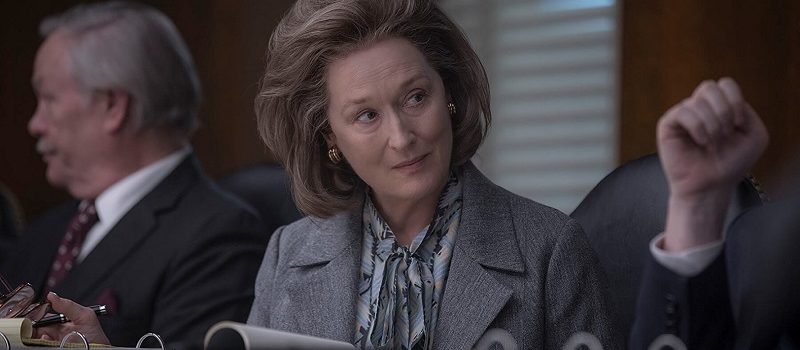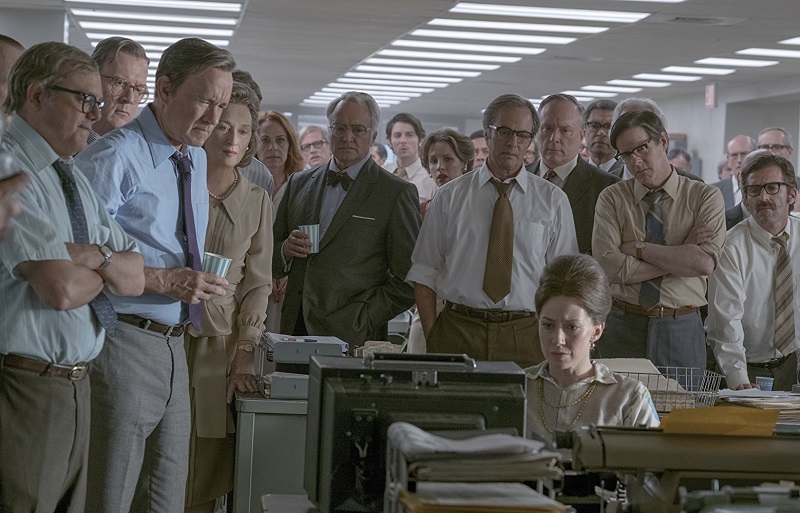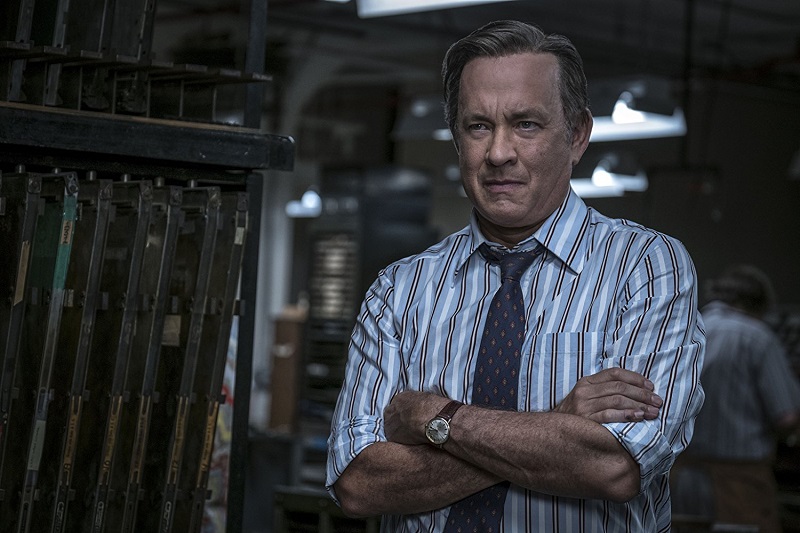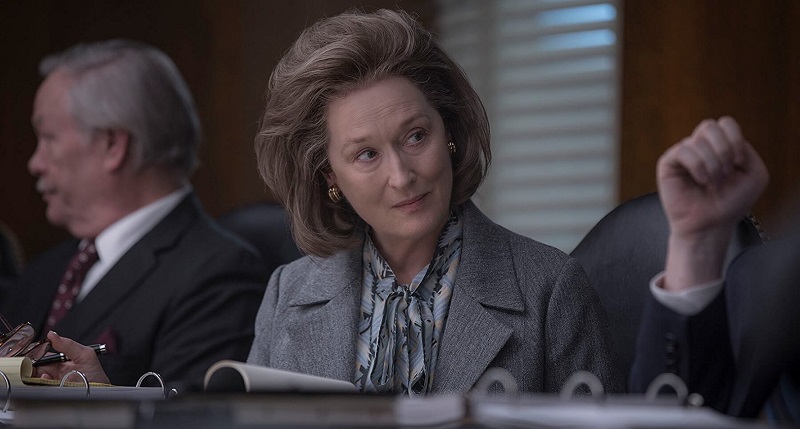The Post is a multitude of things to each soul who witnesses the latest cinematic marvel from Steven Spielberg. Some might see the film as a stinging indictment on our current presidential administration and its avalanche of lies and war on the press. Others may find it a lesson in events of another era that must be learned from in order to not repeat the mistakes of past as they become headlines of the present.
One aspect that is hard to miss in this true tale of the battle between The Washington Post (truly the entire institution of journalism) and the U.S. Government, specifically President Nixon, is that the players that inhabit this mesmerizing journalistic study firmly shape who we are today as a nation.
It is the early seventies. The Vietnam War is raging and The New York Times stumbles on what would become known as The Pentagon Papers. It is a study commissioned by JFK and LBJ’s Secretary of Defense Robert McNamara (Bruce Greenwood) to scholastically chronicle how we got into the conflict in Southeast Asia and where the war needs to go in order to come to a satisfactory conclusion for the Americans. What the report shows was a four-administration-long systematic effort to lie and deceive the public into a false sense that the battle for Vietnam could be one that could end positively.
The Pentagon Papers was a shocking reveal and considering it was filled with loads of classified information, the Nixon administration argued that the press had no business reporting on it. The New York Times was barred by a New York judge from publishing any more features on the shocking truths contained in the report after the first publication.
Tired of coming in second to the gold standard of journalism that promises “all the news that’s fit to print,” Washington Post editor Ben Bradlee (Tom Hanks) rallies his reporters. Their mettle is about to be tested and the process of how The Pentagon Papers came into possession of the Post serves as the heart and soul of the dramatic rich and thrilling The Post. Through Liz Hannah’s sensational Sorkin-esque script, a picture is painted that rivetingly explores the legal, patriotic, moral and financial collateral damage of this truly historic moment in time.
Kay Graham (Meryl Streep) is the publisher of the premiere newspaper of the nation’s capital. She is navigating landmine-filled choppy seas as the first female leader of a major American newspaper. In the hands of Streep, Graham’s character arc is handled with deeply moving aplomb and an ever-growing assuredness that she is on the right side of history. She is an integral part of pushing back in a power grab of astoundingly dangerous means. The executive branch of the United States is standing between her and everything she cherishes. It was a time where a president was dictating which news outlets may cover his White House, and not simply affairs of the state, but even the wedding of his daughter. A political game of chicken was about to be sparked, with Graham on one side and Nixon and the entire power of the U.S. government on the other.
How Spielberg lays out the pieces to his political puzzle plays out is an epically entertaining and electrically enthralling manner. The legendary director came across the neophyte screenwriter’s work not long ago and despite being knee-deep in getting Ready Player One off the ground, immediately dove into The Post. One can see why. Stories so well laid out and important do not arrive on filmmaker’s desks every day… not even every decade.
Casting Hanks and Streep as Bradley and Graham is as stroke of casting genius. Of course, our time’s best actress and one of our most magnificent and malleable actors joining forces is a no-brainer. But, this story is so important and there are numerous nuances to these characters that would require the most astute work of any thespian’s career. Titanic levels of weight fell on the shoulders of these living legends when presented with tackling these parts. Each has brilliantly bound themselves to these people in the most sublime of ways.
Think you’ve seen the best of Hanks and Streep? Think again.
Hanks takes a rougher take to Bradley than he has with past souls he’s inhabited. This is a no nonsense, no holds barred journalist general who firmly believes that he can usher in greatness from all those around him. The twice Oscar-winning actor (who will be nominated again for this role, without question) expects much from his audience too. The Post not only will make you think, it manages to entertain while it prompts an active debate in the viewer’s mind that all works like a finely tuned chorus. It is through Hanks, in particular, that that command arises and it is a side of him that is new and extraordinary.
Streep works an arc like nobody’s business. Yet, there is something unique about the journey of Graham. This is a woman standing still on the bridge of a time and history, unsure which way to walk. As a woman, she could be invisible to many. Socially accustomed to that role, she takes it in stride. Advisors abound, and opinions fly, but gradually in the most crushing of crescendos, Streep gives Graham life in a way that is tear-inducingly inspiring. The most honored performers of all time turns in a role that will become a new benchmark for her legacy.
The ensemble of The Post is a who’s-who of actors and actresses who leapt at the opportunity to work in a Spielberg film, but also to share screen moments with two of the most giving scene partners who exist. Better Call Saul’s Bob Odenkirk dazzles as the reporter who is truly the lynchpin for the entire affair. So great to see our old Mr. Show star continue to raise the bar. Joining him in an onscreen Mr. Show reunion is David Cross, who delivers as fellow reporter Howard Simons. Alison Brie is Kat’s daughter Lally. Seeing her go toe-to-toe with Streep and sharing some of the film’s most emotionally wrought moments is a marvel. Carrie Coon’s Meg Greenfield is a fierce force of nature while Bradley Whitford delights as what is essentially the embodiment of the antagonist within The Post world. The Americans’ Matthew Rhys loses himself as the spark to this powder keg, whistleblower Daniel Ellsberg. Lastly, one must salute Sarah Paulson. She is given what could be a thankless role as Bradley’s wife Tony. Yet in her heaven-sent hands, Paulson delivers a career best monologue that sends our hero into battle. It is in many ways, The Post’s version of Paul Revere’s “The British are Coming’s rallying cry.
Each carefully calculated scene of the movie maestro’s newest Oscar contender becomes more urgent than the last. When the simultaneously timeless and timely story reaches its zenith, all involved have combined to weave a celluloid web that paints a moment in history when our precious democracy faced its greatest challenge. The Post is a profound piece of stunning storytelling that is a must-see for any person who values the institution of democracy and her long-term health.
Grade: A+




